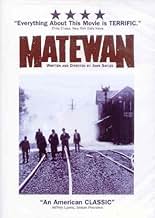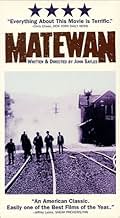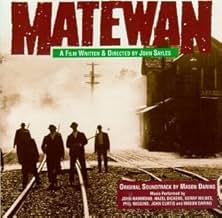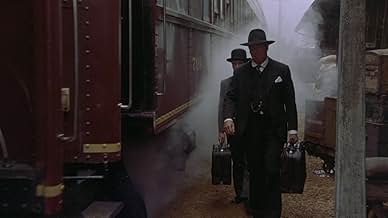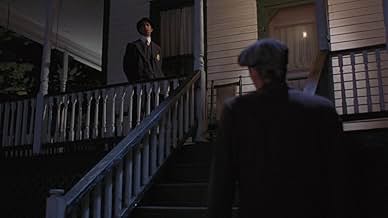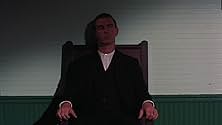A labor union organizer comes to an embattled mining community in 1920 West Virginia, brutally and violently dominated and harassed by the mining company.A labor union organizer comes to an embattled mining community in 1920 West Virginia, brutally and violently dominated and harassed by the mining company.A labor union organizer comes to an embattled mining community in 1920 West Virginia, brutally and violently dominated and harassed by the mining company.
- Nominated for 1 Oscar
- 3 wins & 8 nominations total
- Ellix
- (as Michael Preston)
- Director
- Writer
- All cast & crew
- Production, box office & more at IMDbPro
Featured reviews
The conditions these workers faced were brutal. Miners had to pay for all their own equipment, their housing was owned by the mining company and they also paid for it, workers were also paid in credits which they could only use at the mining company store. Workers who went strike were subsequently evicted from their homes.
This movie is great. It's a page from history which should be told much more often. James Earl Jones is terrific as a black miner who is signed up as a scab but he's actually a union sympathizer who encourages the black scabs to strike with the West Virginia workers.
Chris Cooper is also great as a union organizer. I think he's a highly underrated actor. He was very good in American Beauty as the hick next door neighbor and he's great in Matewan as well. Proof, I believe that he can really take on any role.
Bob Gunton is also a great actor. This movie was made long before he was playing every two bit villain of the week. I think that was due to his role as the warden in The Shawshank Redemption where he just let it all out.
I liked one scene in particular early in the film where the union men on strike try to weed out Cooper by finding out how much he knows about union history. Where was Joe Hill buried? In which eye was Big Bill Haywood blind in? Cooper also quips, "I was a Wobbly, back when that meant something" But he does support the notion of One Big Union. The IWW will rise again!
One needs to search intensely to finally reveal the true history of our period of industrialization. It is of great credit to the producer's and director's of such films as "Matewan" that we can see clearly the history and ongoing great struggle between the working class and the wealthy elite to obtain their proper share of "profits."
This is a film where one enters a theater to be "entertained", but leaves having the stirrings of compassion and outrage raised in their hearts. It reminds us that there is a human price paid for economic gain.
Historically, the film documents a victory (some say massacre) by the miners over the power brokers and thugs of the early 20th century coal mining industry. Taken in the overall context of the history of Appalachian coal mining, however, what it truly documents is one battle in a war that was eventually lost when the government once again came down on the side of commerce as opposed to human dignity at the battle of Blair Mountain.
Fortunately for us, Mr. Sayles seems all too keenly aware of the tremendously important under-currents of this historical event. Rather than merely documenting the conflict and violence of this historic event, he artfully imbues the story with human elements of betrayal, regret, loss, resolve, and ultimately, sacrifice in the name of what is right and just. He reminds us that righteousness often comes with a price and that the real war is never won or lost but rages on forever, claiming the salvation and damnation of souls in it's wake.
This film is a masterpiece and deserves its due. It represents everything good about film-making and should hold a special place in the hearts of all free Americans aspiring to the ideals expressed in our constitution.
Chris Cooper, as Joe Menehan, plays a union organizer intent upon bringing the miners of Matewan out from underneath the heel of the coal mine owners. When intimidation and terror tactics fail to cow the locals, the mine operators and their private security thugs bring in scabs, nominally led by "Few Clothes" Johnson - played by James Earl Jones. When the scabs join the strikers the mine operators resort to all-out warfare against the unionized miners.
David Strathairn, Chris Cooper, James Earl Jones, Mary McDonnell - everyone on the cast delivers a believable, wonderful performance. Everything in this movie makes you feel as if you were really there and depicts this often overlooked event in American history with a stark realism that will leave you thinking about it over and over for a very long time.
Such is the impact of the direction, acting, and writing of this movie that when I saw this movie on video about a week ago, it was still as fresh in my mind as when I saw it last on the big screen on opening day.
10 out of 10. Truly an overlooked classic.
Did you know
- TriviaThe miners' union was broken by 1921, after President Warren G. Harding put the entire state of West Virginia under martial law and sent the army to the coalfields to defend the companies against their employees. By then, hundreds of miners had been killed, thousands arrested and jailed. It was not until 1935, under Franklin D. Roosevelt's New Deal, that union organizing was legally protected in the United States.
- GoofsLook for the sheriff to remove a gun from someone's hand (by holding the gun by the barrel) after it's been fired four or five times.
- Quotes
Joe Kenehan: You think this man is the enemy? Huh? This is a worker! Any union keeps this man out ain't a union, it's a goddam club! They got you fightin' white against colored, native against foreign, hollow against hollow, when you know there ain't but two sides in this world - them that work and them that don't. You work, they don't. That's all you get to know about the enemy.
- How long is Matewan?Powered by Alexa
Details
Box office
- Budget
- $4,000,000 (estimated)
- Gross US & Canada
- $1,680,358
- Opening weekend US & Canada
- $23,850
- Aug 30, 1987
- Gross worldwide
- $1,680,358


